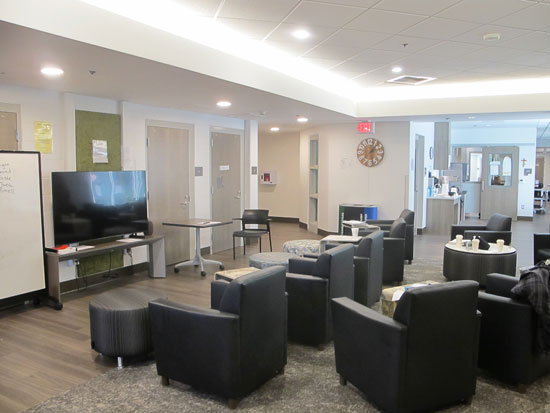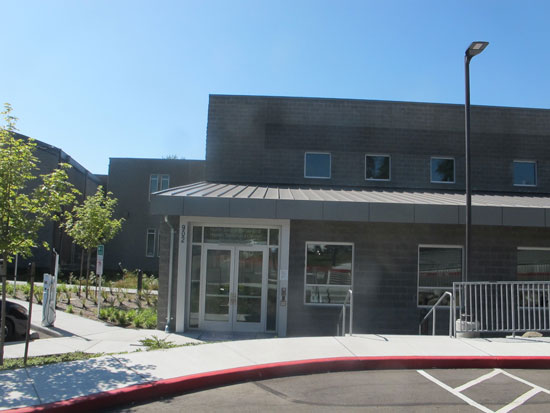EVERETT — The 30-some employees in the county’s inpatient recovery and treatment facility acknowledged the center’s one-year anniversary of operations with a sheet cake and soda pop Aug. 2.
The little party offered a quick breather to the serious work they do here.
The facility regularly has 32 adult patients with substance abuse problems. Each is here for short-term but intensive, 24/7 rehabilitation to try to put addiction firmly in their past. Some were put here via drug court arrangements for treatment instead of jail. A majority have co-occurring mental health and substance use disorder, and this place gives wraparound treatment for both.
Practically every patient is getting a chance to return to sobriety that’s usually financially unavailable to them, as this facility only takes patients on Medicaid.
So far, as of July 30, some 227 men and women have received treatment, according to facility director Marie Preftes Arenz of Pioneer Human Services, the nonprofit contracted by the county to run the center.
“To have been open a year and have served 220 clients, that’s pretty cool,” Preftes Arenz said in reflection.
And, at the end of the stay, before discharge, case managers arrange housing for each patient. One path might be an Oxford House, which mandates sober living.
A significant number of the patients have an opioid use disorder together with mental health challenges. Self-medicating with opioids for whatever reason is one vector to how people become addicted.
 Gathering spaces allow patients to take classes, watch movies and have a seat.
Gathering spaces allow patients to take classes, watch movies and have a seat. This facility was carved from an unused part of the Denney Juvenile Justice Center.
Inside, each patient has their own room. There are books, exercise machines – anything to keep their mind occupied.
While in residential treatment, the patients attend classes, have movie nights and weekend barbecues.
Their classes focus on retraining the brain: Personal life management, coping skills and a type of cognitive behavioral therapy to suppress negative thoughts. Evenings include visiting 12-step recovery programs.
The patients are allowed mind medications such as Seroquel, Wellbutrin and Zoloft to regulate their withdrawals and mental health needs.
When you’ve started an addiction, it never exactly goes away, though. Personal power suppresses it.
There have been people who have relapsed, Preftes Arenz said. Returning isn’t as simple as knocking on the front door; it requires the same process of being referred in.
Once someone is referred for inpatient treatment, though, the wait times to enter are as short as 30 days.
The goal is to rehabilitate and discharge a patient after 56 days of intense inpatient work with substance abuse professionals and peer counselors — a little under two months. Some stay as long as 90 days.
It serves a large footprint. Few centers statewide work with patients with co-occurring disorders as the North Sound Behavioral Health Treatment Center for men and women.
Of the 30 patients that were in residence on Aug. 2, 11 originated from King County, 10 from Snohomish County, six from Skagit, two from Whatcom and one from Thurston County. They were referred here from treatment providers including Evergreen Recovery of Everett, Ideal Option, Catholic Community Services and the detox facilities run by Pioneer Human Services, which operates this center. Eleven were placed by King County’s drug court system, although not all eleven in that drug court are King County residents.
Before reaching the center, professionals assess if intensive inpatient is needed. Many people rehabilitate through outpatient services without a bed stay.
Snohomish County’s drug court system sends people to get an evaluation for whether they should be in inpatient or outpatient services at a facility in Shoreline.
It’s all voluntary. People need to choose to enter. Doing so takes courage, Preftes Arenz said.
But especially for those in drug court, it’s not a vacation to jail. It’s a full-time commitment. Rarely does anyone abuse the hand up they’ve been given to kill an addiction that could ultimately kill them.
A key prohibition is cell phones. It’s because they can’t allow patients to photograph others in treatment without consent, Preftes Arenz explained. Landlines are available.
The county cobbled together millions of dollars in grants specifically with this service in mind.
When they split an unused part of Denney off to create the center, the east wing of the juvenile detention jail was refashioned and upgraded. Crews began its transformation in 2020 for a year of construction.
 Michael Whitney photo
Michael Whitney photoThe men and women stay in Denney’s old concrete cells that are furnished with new beds, dressers and desks.
Every effort was made to separate the incarcerated youth and the adults undergoing treatment “so there’s no sight and no sound” between them, said Cammy Hart-Anderson, the Division Manager for Chemical Dependency, Mental Health and Veterans Services in Snohomish County’s Human Services Department.
A locked door to a sallyport passageway disallows patients from ever entering the children’s area.
There’s a paucity of places such as the North Sound Behavioral Health Treatment Center.
Preftes Arenz said it takes a community to step up to addiction.
“I know drug addiction is everywhere, but the problem isn’t going to go away by judging people in addiction,” Preftes Arenz said.
Her advice is that people should contact legislators to ask what they will do to address the issue.